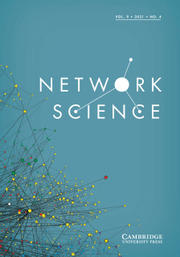Article contents
Transitivity correlation: A descriptive measure of network transitivity
Published online by Cambridge University Press: 23 September 2019
Abstract
This paper proposes that common measures for network transitivity, based on the enumeration of transitive triples, do not reflect the theoretical statements about transitivity they aim to describe. These statements are often formulated as comparative conditional probabilities, but these are not directly reflected by simple functions of enumerations. We think that a better approach is obtained by considering the probability of a tie between two randomly drawn nodes, conditional on selected features of the network. Two measures of transitivity based on correlation coefficients between the existence of a tie and the existence, or the number, of two-paths between the nodes are developed, and called “Transitivity Phi” and “Transitivity Correlation.” Some desirable properties for these measures are studied and compared to existing clustering coefficients, in both random (Erdös–Renyi) and in stylized networks (windmills). Furthermore, it is shown that in a directed graph, under the condition of zero Transitivity Correlation, the total number of transitive triples is determined by four underlying features: size, density, reciprocity, and the covariance between in- and outdegrees. Also, it is demonstrated that plotting conditional probability of ties, given the number of two-paths, provides valuable insights into empirical regularities and irregularities of transitivity patterns.
Keywords
- Type
- Original Article
- Information
- Copyright
- © Cambridge University Press 2019
References
- 4
- Cited by


